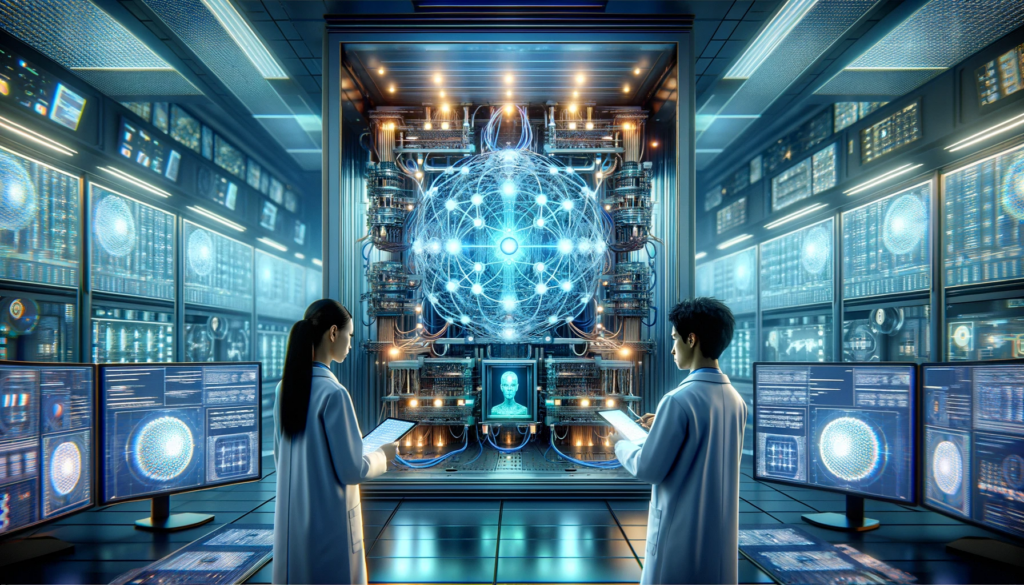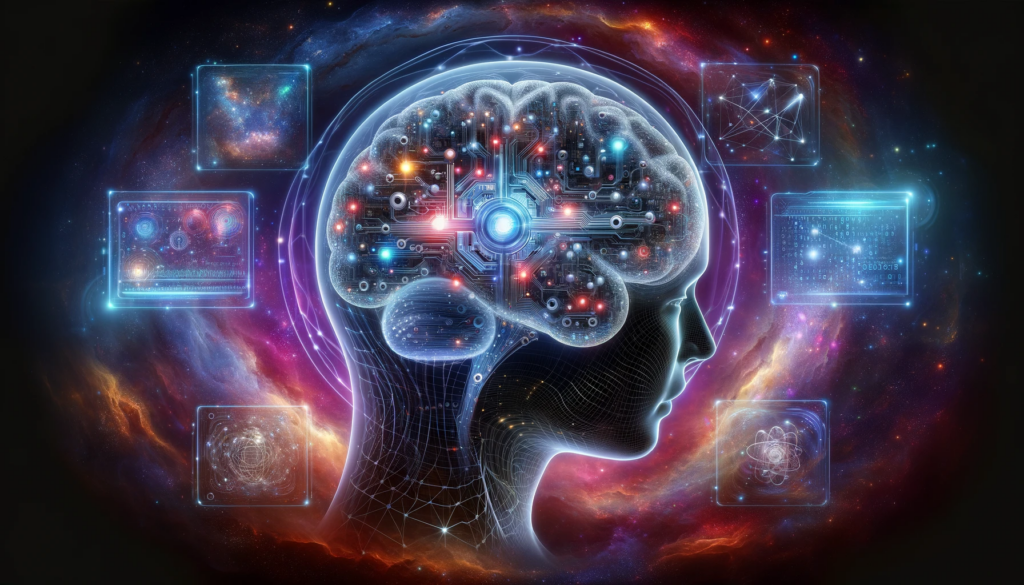Quantum AI is revolutionizing how we think about computing and problem-solving. At the heart of this revolution are quantum algorithms. Here, BQP or Bounded-error Quantum Polynomial time plays a pivotal role. This capability opens up a realm of possibilities in processing power and speed. Imagine solving the unsolvable, unlocking new dimensions of data, and revolutionizing industries at an atomic level. Discover how the principles of BQP underneath quantum algorithms take Quantum AI beyond conventional boundaries.

Write Why Should You Read This Article?
Are you curious about the future? Do you wonder about smart computers? This article talks about Quantum AI. It’s a new kind of computer thinking. It’s very powerful. It can change many things like health, money, and how we learn. Reading this helps you know more. You can understand big changes coming. If you want to know about new tech, this is for you. It will make you ready for what’s next. So, why not start now?
What is Quantum AI?
Quantum AI is an exhilarating frontier where quantum computing meets artificial intelligence. It uses the characteristics of quantum mechanics to process information in ways that classical computers can’t. Quantum AI takes advantage of the computational might of qubits. These are the basic units of quantum information, to analyze data. It solves problems at speeds previously unthinkable.
At the intersection of these two domains, Quantum AI is poised to revolutionize industries by solving problems that are intractable for classical computers. This emerging field has the potential to transform everything from drug discovery to financial modeling and from supply chain optimization to climate forecasting. By leveraging quantum technology’s vast computing power, AI algorithms can be supercharged to tackle complex tasks more efficiently. This will lead to breakthroughs that propel economies and societies forward.
The Fundamentals of Qubits
Qubits, or quantum bits, are the fundamental building blocks in quantum computing. Unlike classical bits that hold a single binary value of 0 or 1, qubits can exist in a state of superposition. Here they use multiple states simultaneously. This property dramatically increases the computing power of quantum systems.
Qubits are also capable of entanglement, a quantum phenomenon where pairs or groups of qubits become interconnected. The state of one (no matter the distance from its pair) can instantaneously affect the state of the other. This leads to parallelism and synchronization, which is impossible with classical bits.
The properties of superposition and entanglement set quantum computing apart, enabling qubits to perform multiple calculations simultaneously. This promises to unlock new potential in computing speed and capacity.

BQP Explained
Bounded-error Quantum Polynomial-time, or BQP, is the class of decision problems solvable by a quantum computer in polynomial time, with a probability of error less than 1/3 for all instances. In layman’s terms, it describes the set of problems that quantum computers can solve quickly and accurately, a subset of all decision problems.
BQP is important in quantum computing because it defines the boundaries of what quantum machines can feasibly solve. It offers a framework for understanding their capabilities. It is a quantum analog to the complexity classes P and NP in classical computing, which classify problems by their difficulty and the resources needed to solve them.
While P includes problems that classical computers can solve quickly (in polynomial time). NP contains problems for which the solution can be verified quickly but may take time to resolve. Quantum computing, and specifically BQP, has the potential to solve some of these NP problems efficiently. This would be a magnificent leap over classical computing capabilities. However, the exact relationship between BQP and NP and whether quantum computers can solve all NP problems remains among the biggest questions in theoretical computer science and quantum computing.
Quantum Algorithms and BQP
Quantum algorithms are instructions that guide quantum computers in using their qubits to solve problems. These problems are often too complex for classical computers to handle efficiently. Quantum algorithms fall within the BQP class, meaning they can solve certain problems quickly (in polynomial time) and with a low probability of error.
- How Quantum Algorithms Work
- Use qubits: Unlike regular bits, qubits can be in multiple states simultaneously due to superposition.
- Leverage entanglement: Qubits can be entangled, meaning the state of one affects another, no matter the distance. This helps quantum computers to solve problems faster.
- Examples of Quantum Algorithms
- Shor’s algorithm: Famous for its potential to factor large numbers quickly, which could make current encryption methods obsolete.
- Grover’s algorithm: This algorithm can search through unordered data in a fraction of the time it would take a classical computer.
- Potential for Speed:
Quantum algorithms have the potential to solve problems exponentially faster than classical algorithms. This could make a huge difference in fields that rely on heavy computation, like cryptography, optimization, and simulation.
Quantum Machine Learning
In quantum machine learning, quantum algorithms are applied to improve how computers learn from data. Quantum computers have the potential to process and analyze large, complex datasets more effectively than classical computers.
- Enhancing Machine Learning:
- Quantum algorithms: They can identify patterns in data more quickly and accurately.
- Handling complex dat Quantum computers can manage data with many variables, challenging classical machine learning.
- Quantum-Enhanced Models:
- Better predictions: Quantum models could make more accurate predictions by analyzing more data points simultaneously.
- Solving new problems: Certain machine learning problems that are currently unsolvable could be tackled with quantum computers.
- Benefits Of Traditional Machine Learning:
- Speed: Learning from data can be drastically faster, which speeds up the development of new models and algorithms.
- Power: Quantum computers can process vast quantities of data at once, which could lead to more sophisticated AI systems.
- Innovation: Quantum machine learning could help us solve previously thought unsolvable problems.
Real-World Applications
Quantum AI is starting to move from theory to practice, with potential applications across various sectors:
- Current and Future Applications:
- Healthcare: Quantum AI can help design new drugs by simulating molecular interactions at a level of detail impossible for classical computers.
- Finance: Algorithms can analyze market data to identify patterns and predict changes more accurately.
- Transportation: Optimizing logistics and traffic flow to improve efficiency and reduce costs.
- Industries That Could Be Transformed:
- Energy: Quantum AI could lead to the development of more efficient energy sources and help optimize energy distribution in power grids.
- Material Science: It can accelerate the discovery of new materials with desired properties, such as strength, lightweight, or conductivity.
- Challenges and Limitations:
- Technical challenges: Building and maintaining quantum computers is difficult, as they require extremely low temperatures and are prone to errors.
- Theoretical limits: We are still exploring the full capabilities of quantum AI and which problems it can solve more effectively.
- Resource-intensive: Quantum computers are large, expensive, and require many resources.
The Future of Quantum AI
The future of Quantum AI looks promising, with rapid growth anticipated in the coming years. As research and development continue, we can expect breakthroughs that could redefine computing as we know it. The relationship between quantum computing and AI will likely spawn innovative solutions to some of the world’s most complex problems. Staying informed and engaged with Quantum AI is important for businesses, researchers, and policymakers. This technology has the potential to impact many facets of our lives. As quantum technology becomes more accessible, we will see its integration into various industries, fostering a new era of efficiency and discovery.
FAQs about Quantum AI
What is Quantum AI?
Quantum AI combines quantum computing with artificial intelligence. It uses the principles of quantum mechanics to process information in new, powerful ways.
Why is Quantum AI important?
Quantum AI can solve complex problems much faster than traditional computers. It could change health care, finance, and many other fields.
How does Quantum AI work?
Quantum AI works by using qubits instead of bits. Qubits can be in more than one state at once. This lets quantum computers do many calculations at the same time.
What is BQP?
BQP stands for Bounded Error Quantum Polynomial Time. It is a class of problems that quantum computers can solve quickly and with little chance of error.
Can Quantum AI improve machine learning?
Quantum AI can process large datasets better and find patterns faster. This can make machine learning much more powerful.
Are there real-world applications of Quantum AI now?
Yes, it’s starting to be used in areas like drug development, financial modeling, and traffic optimization.
What industries could Quantum AI transform?
Quantum AI could transform many industries, including healthcare, finance, energy, and material science.
Is Quantum AI difficult to understand?
Quantum AI is a complex subject, but we explain it with simple words and ideas so you can grasp the basics.
Why should I stay informed about Quantum AI?
Staying informed helps you prepare for future technological changes and could offer new opportunities in your career or business.
Where can I learn more about Quantum AI?
You can learn more by visiting websites focused on Quantum AI, like Quantum Leap into AI, which provides updates and insights into the field.
Conclusion
Quantum AI is a big step in how computers think and solve problems. It’s like having a super-powerful brain that can do things normal computers can’t. This is important for keeping data safe, making new medicines, and helping our planet. If you’re curious and want to know more, now’s a great time to start learning. A good place to begin is a website all about Quantum AI. It’s full of information on what’s new and exciting in this area. Why not check it out? It’s your doorway to the future of technology!Get set for a thrilling journey with Quantum AI! It’s the future, happening now. Want to know more? Jump over to the Quantum AI website. Your future self will thank you! Go to Quantum AI.










